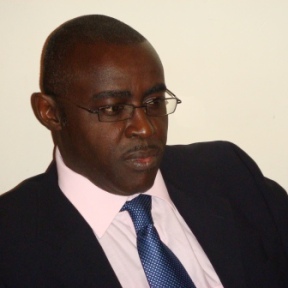Nigerian Students Need to be Disciplined, Says Adejumo
Interview Tuesday, August 12th, 2014
Akintokunbo A. Adejumo, a social and political commentator on Nigerian issues, shares his life and work between London, UK and Nigeria. He is a graduate of Agriculture from the University of Ibadan, Nigeria (1979) where he was Commissioner for Health, Independence Hall, in 1976/77; and a Master’s degree in Food Science from the University of Manitoba, Canada (1985) where he was the President, the International Students Organisation in 1982/83. He writes on topical issues for several newspapers and internet media.
He is also the Global Coordinator of CHAMPIONS FOR NIGERIA, www.championsfornigeria.com , an organisation devoted to celebrating genuine progress, excellence, commitment, selfless and unalloyed service to Nigeria and the people of Nigeria.
He recently granted an interview to The Guardian Newspapers to express his views on some aspects of student unionism and activism in the current political dispensation and socio-political environment. The interview was published on Sunday, 03 August 2014, written by GREGORY AUSTIN NWAKUNOR
Published below is the full version of the online interview:
What would you say has been the difference between students’ unionism in your days and now?
Let me first correct a common mistake people make when trying to make comparisons. In my days (late 1970’s) at the university (I am a proud alumnus of Nigeria’s Premier University, the University of Ibadan) not only by virtue of just being a student, I was a participant in student unionism and knew what was going on intimately; today, about 40 years later, I am no longer within the student union system, nor conversant with its workings and politics, so it is very difficult and perhaps, unfair, to make comparisons.
However, I will try to make some assessments. In those days in the 70s, student unionism in Nigeria, unbelievably, was thriving and very effective even under the military regimes of those days more than now in the democratic dispensation. The military were ruling with edicts, decrees and with largely strong-arm tactics (Gowon and Obasanjo), yet it was surprising, when we look at it with the benefit of hindsight, that the then military governments were relatively benign and sympathetic towards students, (even despite the avoidable loss of lives during protests) respected us and our views and were, in most cases, very concerned when we took to the streets. For example, the Obasanjo regime was very rattled in 1978’s “Ali Must Go” demonstrations during which several students were killed by policemen. The government found it very hard to overcome the negative publicity then and I believe they paid compensations to the families of the deceased. However, they still had their way.
So in those days of ours, student unionism was highly respected and visible in the society. We were a thorn in the flesh of incompetent rulers, and we took our visions and ideals very seriously. Go and check the history, there were never any allegations of student unions or their members playing up to the government or compromised by the governments. The governments were even very wary of buying us off. How can you buy people like late Banji Adegboro and late Segun Okeowo off? Never!
Also in those days, the educational system of Nigeria had not degenerated like it has now. Students go to university and have a very holistic and serious approach to student unionism and a devotion to their education. Some student union executives in some universities and polytechnics, especially presidents, even take (or try to take) a year off their education to concentrate on student unionism and activism, thereby losing a year of study, all in the name of serving the students of Nigeria. Does that happen today? There is not even any space for that because of the irregular sessions and constant close-downs of the higher institutions
Nigerian students valiantly held successive – mostly military – governments accountable through penetrating pieces in newspapers; open discussions and when necessary, street protests, that were carried out in very civilised manner. I was with great pride a very active participant in the “Ali Must Go” protests led by the indefatigable Segun Okeowo’s then National Union of Nigerian Students (NUNS) in 1978 in a struggle against the educational policies of the military regime of Olusegun Obasanjo. We fought on all fronts and brought education to the front burner of national discourse. Though we lost to the government, we won the public and the society’s respect and sympathy.
Would you say that the current leadership of NANS have lived up to expectation?
From what I have elaborated above, one is tempted to conclude that the current leadership of NANS have not lived up to expectations. I will be frank, I am not even aware of what they are up to, but that is not to say they are not active. This is their time, not mine or ours. But then, we have to be careful here. Whose expectations are we expecting them to live up to? Is it to this generally sick and depraved society, the corrupt, greedy, selfish and insensitive people in government and politics and the incompetent and clueless state and local governments? Or should it be to themselves – the students and other youths in the society? Expectations have to be defined, before we can assess and judge.
Today, I do not know what to expect from student unionism, in the shape of NANS, probably because I am not a student anymore. In fact, I don’t know whether it is fair to expect anything from them, considering the general degraded confused, impoverished and oppressive state of the nation. These are students struggling to survive; the government is barely responding and delivering its responsibilities to the students; their parents are under extreme pressures to educate them qualitatively. Such students are prone and very susceptible to the temptations besieging them left and right by corrupt politicians who are ready to make use of them; by crooks and criminals who also want to exploit them; and by a society who does not care about them. So I am a bit, but just a bit, sympathetic with the plight of students, and hence students unionism in this country. They are operating under a very difficult terrain, which is ironic, because one would expect them to fare much better and best in a democratic setting rather than a military regime, but it is the other way round. Therefore they succumb to the lure of lucre, promises of positions and power and wealth and become easily compromised. They are a product of the same society as the corrupt politicians and civil servants, aren’t they? Even their parents and family encourage their corruption, simply because they want the best for their children. So it is a whole rotten society.
Why do former union leaders easily become political office holders?
In a sane and good society, in a true democracy, there is nothing wrong in former student union leaders becoming political office holders. First, as citizens of this country, that guarantees their rights to hold such offices, whether by election or appointment. Secondly, do they easily become political office holders? No! Only a few of them are political office holders.
However, I will admit that many of those who have become political office holders have always been disappointing and seem to have betrayed their former followers. In a way, this is a Nigerian syndrome. Many anti-government activists over the years, whether students or journalists or labour unions, have been accused of “crossing over” to government side when they are appointed to positions. Some have been deliberately vocal during their activism or unionism days, but only to get noticed for the future, so that an appointment will come their way one day. Some not deliberately so, but find themselves trapped within the corrupt system; unfortunately instead of resigning to keep their dignity and credibility, decided, rightly or wrongly, that they can still change the system from within, and before they know it, they are compromised.
So it is not a matter of ease or difficulty to become political office holders. Some have planned for it through their noise-making and sabre-rattling just to get noticed. Some were just purely lucky to be appointed. And some, to be fair, were altruistic in their motives to hold offices, elected or appointed, and go for it, only to be swallowed up by the corrupt system they are operating in. A rare few, managed to get off unscathed by the system, in haste.
And why have many betrayed the cause of unionism?
What is the cause of student unionism? What does that mean really? That phrase needs to be defined because I doubt if any of the current student unionists we have today can account for the reason why they are student unionists. Is it just to fight the government on issues ranging from school fees to accommodation to lack of quality education? Is it about tackling the evils of the society at large or just campus politics?
Universally, the purpose of students’ union or student government is to represent fellow students in some fashion. The purpose of student unionism is to represent students both within the institution and externally, including on local and national issues. Students’ unions are also responsible for providing a variety of services to students, dedicated to social, organizational activities, representation and academic support of the membership. Some students’ unions are politicized bodies, and often serve as a training ground for aspiring politicians.
So the problem with students’ unionism in Nigeria, especially in the current dispensation, is the lack of defined goals. Or rather, a departure from defined goals. In the 60s and 70s, Nigerian student unionism and activism were very much well defined. We do not take to the streets just for the fun of it. We make the government reckon with us, even if on the long run the government has its way, which they always do anyway, but we always make them listen to us and reckon with us; they have registered our protest and are careful in the way they bring out their next provoking policy. More importantly, is the fact that the society, the public always used to support the students, who are of high moral and educational integrity and calibre, in those days. Not any more, they don’t, for good reasons too. Our society now, even as depraved and corrupt and bad as it is now, rightly do not, and cannot place any premium on today’s students and what they do, because, being co-travellers and cliques of the downward spiral and moral destruction of Nigeria, know each other’s culpability and secrets, so have no moral grounds to criticise or offer advice to each other.
My counsel for today’s students unionists
Today’s crop of students has a choice a front of them. They can decide to go back to the era of responsible students’ unionism and contribute their quota to national progress and make a break with this contemporaneous era of incompetence, mediocrity, selfishness, greed, material acquisitiveness, corruption and moral decay by choosing to stay on the path of truth, righteousness and probity. Or they can join in the decades-long destruction of Nigeria, by partaking in the corruption, religious divide and ethnic mauling and a reverse back into the dark ages of primordial politics and governance that we are currently being subverted. It is the choice of the students and youths of this country.
Nigerian students and youths have to purge themselves of the prevailing level of indiscipline before they can lay claim to be the architects and constructors of modern-day Nigeria. As the conscience of a nation, students must be actively involved in development, re-orientation and education of their local or wider society. Students can form local pressure groups to monitor the programmes of their elected governments. This local pressure group can also influence the society through the carrying out of socially positive programmes such as discussions, street pageants, environmental sanitation, road safety, health education, food safety and security and education, such as on the harmful effects of drug use, prostitution, cultism, corruption in high places, profligacy, etc., and position themselves to keep their elected politician on their toes and demand accountability at all times. They must through debates and intellectual discourses make their dispositions known to the governments and the leaders. They should never allow unscrupulous politicians to use them as cannon fodders in their political battles. Nigerian students should become indicators to measure the performance of every government. They can do this if their unions become trustworthy, sincere and upright enough for everybody to believe the judgments they give. But when students hit the streets on the encouragements of power mongers and political troublemakers and begin to wreak havoc on the society, then they would have descended to the level of the common hooligan who is ready to do the evil demand of his paymaster for a mess of pottage.
They must also shun social vices, such as cultism, prostitution, examination cheating and brigandage, for as Philip Massinger puts it “He that would govern others first should be the master of himself”.
Again, the tendency for short cut to success must be discarded. Students must face their first objective – their education – and stop all forms of examination malpractices and cheating. This is to ensure that we preserve the sanctity of our examination process, and of course, credentials issued by our institutions. Nigerian diplomas, degrees and other educational qualifications are fast becoming dubious and in the wider world
Our students, our youths, remain, the most vibrant part of our population. They are not called the leaders of tomorrow for nothing. They are actually tomorrow’s people. However we can have a foretaste of that tomorrow through the way they conduct themselves today. For now there is little to cheer.
First Published in The Guardian
Related Posts
Short URL: https://www.africanexaminer.com/?p=16101





















